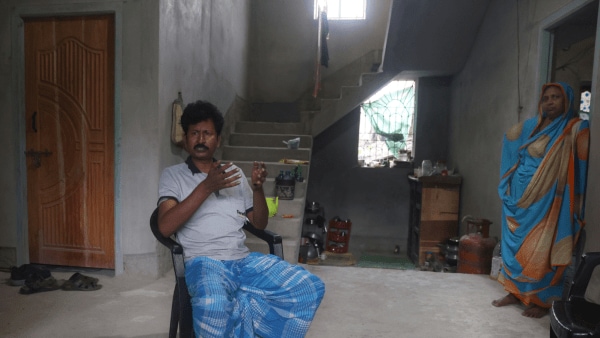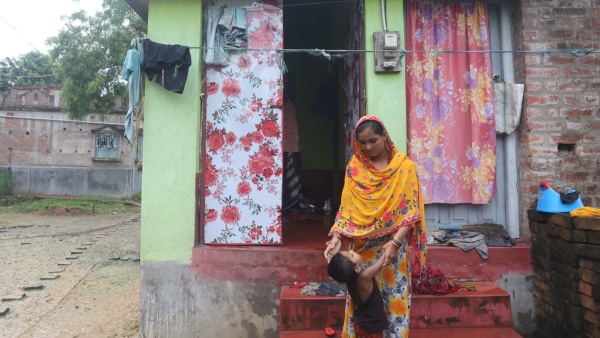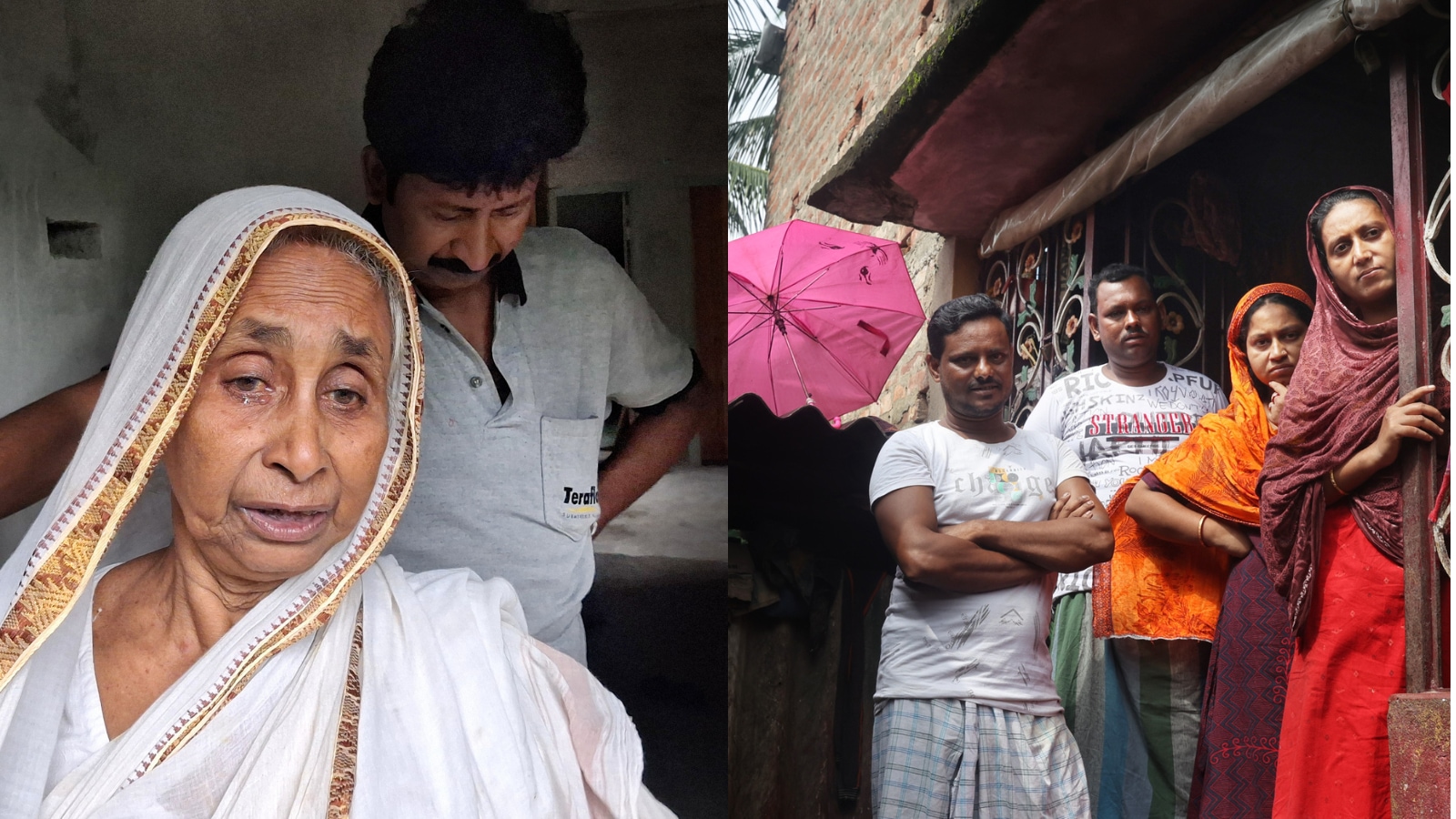I can’t wait to get back to Mumbai,” says Mostafa Kamal Sheikh, 52, his grey T-shirt blending into the grey of the unpainted walls behind him. “Mumbai never sleeps. I used to work from 3 pm to 1 am at night. There is money and there is life. Here in the village, everything shuts down by 6 pm and then it gets all dark,” he says, sitting at his sister’s home in Baghra village in West Bengal’s Purba Bardhman district.
Kamal’s longing for Mumbai — the city where he has made a living since 1999, first as a dockyard worker and then as a ‘jhal muri’ vendor in Nalasopara — is as strong as his memory of a recent nightmare: of being detained by the Mumbai Police, tagged as an illegal Bangladeshi resident, handed over to the Border Security Force (BSF) and finally driven like cattle across the barbed-wire fencing at the border.
The nights he spent on the no-man’s land across the border with Bangladesh were long — and much darker than his village at night.
Story continues below this ad
When he finally got home on June 17 – after the “babus” had verified and established that he was who he claimed to be — Kamal was tired and broken.
Panic over detentions
Kamal is among the thousands of migrant workers from West Bengal who have over the last few months been detained and, in some cases like Kamal’s, pushed into the neighboring country as part of an ongoing drive against illegal Bangladeshis.
In March, The Indian Express had reported how more than 2,000 alleged illegal Bangladeshi immigrants were estimated to have been “pushed back” across the border by Indian authorities since Operation Sindoor began in the early hours of May 7. During this period, sources said, a similar number of immigrants showed up near the India-Bangladesh border voluntarily to cross over.
While the drive against alleged illegal migrants intensified post Pahalgam, reports of detentions had been coming in even earlier from across the country — from Gurgaon, where the Haryana government demolished slums in March, to similar drives in Assam and Gujarat.
Story continues below this ad
With the drive focused on alleged “illegal Bangladeshis”, it’s the Bengali-speaking migrant workers in these cities who have borne the brunt, with some of them packing their bags and returning to their home state.
More detentions followed — in Gujarat and Rajasthan in May, followed by Maharashtra (Mumbai) and Odisha in June, and Delhi and Gurgaon in July. At Jharsuguda in Odisha, 444 Bengali-speaking migrant workers were kept in a detention centre before they were finally released.
Back in West Bengal, which is heading into an election year in a few months, the detentions have turned into a hot-button issue. Chief Minister Mamata Banerjee has initiated a ‘Bhasa Andolan’, calling the drive against illegal Bangladeshi migrants a move by BJP-ruled states to “terrorise Bengali-speaking people”. While the ruling Trinamool and non-NDA parties such as CPI(M) and Congress have taken to the streets in protest, the BJP has accused Chief Minister Mamata Banerjee and her party of indulging in appeasement and vote bank politics.
According to the state government, around 22 lakh migrant workers from West Bengal work outside the state.
Story continues below this ad
 Kamal is among the thousands of migrant workers from West Bengal who have over the last few months been detained
Kamal is among the thousands of migrant workers from West Bengal who have over the last few months been detained
“This is an invisible but huge workforce. We had earlier demanded identity cards for our migrant workers. On April 26, we started a helpline as complaints started to pour in of people being harassed and wrongly detained. We coordinated with the administration and police as they visited houses for verification,” says Asif Faruk, state secretary of the Paschim Banga Parijayi Ayikka Mancha (Unified Forum for Migrants).
Samirul Islam, TMC Rajya Sabha member and chairman of the West Bengal Migrant Labour Welfare Board, says, “We have no objection if the police detain and deport illegal Bangladeshi citizens. But thousands of residents of Bengal are being detained and harassed. Some have been pushed into Bangladesh. This is unacceptable.”
“Also, the police in these states have not been sharing any data or details with our state government of those they are detaining. We get to know of the detentions from family members and then, our police and administration visit their houses and verify their papers. If the papers are in order, we send a report along with the documents to our counterparts in different states seeking the release of the migrants,” he says.
Kamal and others who were detained say that police often asked them to make a quick call to their families seeking land records, school certificates and birth certificates, before taking away their phones. Delay in submitting these documents often meant long detentions or worse — pushbacks across the border, like in Kamal’s case.
‘Where are the jobs?’
Story continues below this ad
It was an SOS video that Kamal and others sent out — recorded on the phones of Bangladeshi citizens in areas near the border — that highlighted their plight and got the state government to verify their documents and intimate the BSF about their legal status.
This was followed by a flag meeting between the BSF and BDR, after which they were finally handed over to the Indian side.
Recalling the nightmarish events of June 9, when he was picked up by the Mumbai Police from his Nalasopara room on suspicion of being a Bangladeshi citizen, he says, “I had come back from the jhal muri stall and was eating my dinner at 3 am, when police raided my room. I gave them all the documents they asked for, but they did not listen and took me away. They did not allow me to finish my dinner.”
Kamal says he and a few others were detained for some days, after which his photograph and fingerprint were taken and the group sent to Pune, where they were handed over to the BSF.
Story continues below this ad
“From there, we were taken to Agartala (Tripura). By then, there were over a 100 of us. From there, we were put into buses and taken to a BSF border camp, where we were divided into groups of four and taken to the border. Around 3 am on June 14, we were herded like cattle and told to pass through a small gate at the barbed wire fencing. Each of us were given 300 Bangladeshi taka and told to run. We pleaded with them, saying we are Indians, but we were caned. So we started running,” says Kamal.
By sunrise, he says, personnel of the Bangladesh Rifles (BDR) spotted them, after which they were told to sit in a spot on the no-man’s land at the border. “Bangladeshi villagers gave us food and water. After two nights there, we were handed over to the BSF first and then to the West Bengal police at Mekhligunj police station (Cooch Behar). Finally, from Berhampore, we returned home,” says Kamal.
Despite a lingering fear, many of his relatives, including his wife and son and nephew Yasir Sheikh, continue to stay in Mumbai.
 Back in West Bengal, which is heading into an election year in a few months, the detentions have turned into a hot-button issue (Express photo by Partha Paul)
Back in West Bengal, which is heading into an election year in a few months, the detentions have turned into a hot-button issue (Express photo by Partha Paul)
Kamal’s sister Tahamina Sheikh, 53, says, “After Bakhri Eid, Yasir went back to Mumbai (where he works in a brokerage firm). We don’t know if he will be harassed, but he had no choice but to go because where are the jobs here? Every day I call him just to find out if he is safe.”
Story continues below this ad
Dabbing her moist eyes, Kamal’s mother Karima Khatun Sheikh, 68, says, “Two of my sons and grandson are in Mumbai. When I heard about Kamal’s situation, I thought I had lost him. It is Allah’s blessings that have brought him back. Why did they have to beat him like that? He could have died. I wake up in the middle of every night wondering how my children are doing in Mumbai. And then, I can’t go back to sleep. I keep worrying.”
‘I’ll leave for Mumbai’
Mounds of sand and bricks lie on the road outside Kamal’s sister’s home in Baghra village. The house is under construction, like many others in the village.
Villagers say every second home has youngsters working outside the state, some as construction workers, others as welders, painters, goldsmiths.
“You ask me why we go outside to work? All this construction and building activity that you see in the village will answer your question. There is money there. More than double of what we can earn anywhere in West Bengal. We work and stay in hovels in Mumbai, Delhi, Rajasthan and Haryana so that our families back home can stay in concrete homes, so that our children can go to good schools and get private tuitions,” says Kamal.
Story continues below this ad
Kamal is now waiting for the “kagoz” that will, once again, establish his identity, before he leaves for Mumbai. “All my documents were seized when I was detained. I got my SIM card re-issued and thereafter, I got back my Aadhaar and E-Shram card. I am still waiting for my PAN card and my voter ID card. Once I get it, I will leave for Mumbai. How long can I stay home?,” says Kamal.

